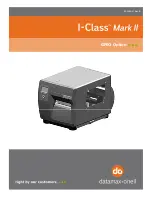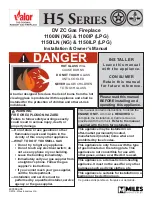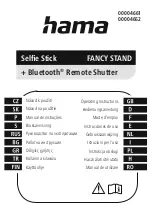
Warning:
The measurement of SpO
2
and PR with SenTec TC Sensors is
only defined on sites specified by the manufacturer (refer to the instrument`s
manual). In order to avoid erroneous readings and false alarms of SpO
2
and
PR, ensure that the appropriate patient type (Adult) is selected. Ensure to
disable the parameters SpO
2
/PR for sensor application on other measurement
sites.
Warning:
The use of temperatures higher than 41°C requires special
attention to patients with susceptible skin, e.g. neonates, geriatric patients,
burn victims, patients with skin diseases.
CAUTION:
A flat, well-perfused area of intact skin is needed (centrally
located sites are preferable). Avoid placement over large superficial veins or
areas of skin breakdown or edema.
Cleaning and Disinfection
CAUTION:
The use of other cleaning and disinfection procedures oth-
er than those recommended here may result in permanent damage to the
sensor.
CAUTION:
Do not remove the membrane of the sensor for cleaning
and disinfection.
CAUTION:
Wiping and/or the application of mechanical force in general
can damage the sensor membrane or the sensor cable mechanically. Wipe the
sensor carefully and inspect the condition of the membrane and sensor cable
after cleaning and/or disinfection.
The OxiVenT™ Sensor must be cleaned before inserting it into the docking
station in order to remove any gel residues or other soils such as blood, protein,
or mucous that could contaminate the docking station, cause cross-infections
between different patients and/or gas leakage during calibration.
In order to remove all foreign substances, the sensor surface should be cleaned
prior to disinfection.
Important:
The cleaning and disinfection solutions listed here have been
tested for their suitability for the OxiVenT
TM
Sensor. The below listed name brand
products for cleaning and disinfection may be substituted by other name brand
products of equivalent composition. However, as there are many factors (contact
time, force applied during wiping etc.) that can influence the functionality of the
sensor, it is the responsibility of the user to test the functionality of the sensor
after cleaning and/or disinfection. SenTec recommends using 70% Isopropanol.
Table 1: Low Level Disinfection
Brand name/
manufacturer
Cleaning procedure
WEBCOL Alcohol Prep
Pads
(Kendal); 70%
Isopropanol
Carefully wipe all SenTec TC Sensor surfaces and
the cable with alcohol wipes and allow to dry.
Mikrozid
(Schülke Mayr)
pre-soaked wipes;
25% Ethanol, 35%
Isopropanol
Kodan® forte
(Schülke&Mayr);
45,0 g 2-Propanol, 10,0 g
1-Propanol, 0,20 g Biphe-
nyl-2-ol, 30% H2O2
Carefully wipe all surfaces of the SenTec TC Sen-
sor and the cable with wipes soaked Kodan forte.
Wait 5 min. Remove all Kodan forte residues using
70% Isopropanol. Allow to dry.
Gigasept® AF
(Schülke&Mayr);
15 g Didecyldimethylam-
moniumchlorid,
10 g Phenoxypropanole,
6,9 g Aminoalkylglycine; 15
– 30% non-ionic tensides.
Carefully wipe all surfaces of the SenTec TC
Sensor and the cable with wipes soaked in 4 %
solution (e.g. 960 ml deionoized water plus 40
ml Gigasept AF). Note that the 4% dilution has a
shelf-life of 7 days. Wait 15 min.
Remove all Gigasept residues using 70% Isopro-
panol. Allow to dry.
OxiVenT™ Sensor
REF OV-A/P/N
Carbon Dioxide Tension, Oxygen Tension and
Oxygen Saturation Sensor
Reusable / Nonsterile / Waterproof
Directions for Use
Introduction
SenTec’s OxiVenT™ Sensor is intended for continuous PCO
2
, PO
2
, SpO
2
/PR
monitoring.
The OxiVenT™ Sensor provides superior performance, is robust, reliable and
requires comparatively low maintenance. It combines within a patented digital
sensor design the optical components needed for 2-wavelength, reflectance
pulse oximetry with the components needed to measure PCO
2
and PO
2
.
Indications/Contraindications
The OxiVenT™ Sensor (REF OV-A/P/N) is indicated for use when continuous
non-invasive monitoring of carbon dioxide tension, oxygen tension, oxygen
saturation, and pulse rate are required for adult and pediatric patients. In
neonatal patients the use of the OxiVenT™ Sensor is indicated for carbon
dioxide tension and oxygen tension monitoring only. Oxygen tension monitoring
is contraindicated for patients under gas anesthesia. The OxiVenT™ Sensor
is for use only with SenTec instruments and instruments that contain SenTec
monitoring technology or are licenced to use SenTec sensors (SenTec-
compatible instruments).
Instructions for use
Preparation - Membrane change
The membrane and the electrolyte of the OxiVenT™ Sensor must be changed
regularly. The monitor requests a membrane change if required. Additionally,
the membrane of the sensor must be changed if it is damaged, does not have
a tight fit, or if there is trapped air or dry electrolyte under the membrane. For
further information refer to the Instruction Manual for the SDMS, the Membrane
Changer Directions for Use for detailed membrane change instructions, and the
Technical Manual for the SDM or contact the manufacturer of the instrument.
Preparation - Calibration
The PCO
2
segment and - less frequent - the PO
2
segment of the OxiVenT™
Sensor must be calibrated regularly. Between monitoring it is recommended to
store the sensor in the docking station. This will ensure that the sensor is ready
for use, as the sensor will automatically be calibrated as needed. For further
information refer to the Instruction Manual for the SDMS and the Technical
Manual for the SDM or contact the manufacturer of the instrument.
Patient Application of the OxiVenT™ Sensor
The choice of the sensor attachment accessory depends on the patient’s age,
the parameters to be measured and the skin condition at the measurement
site. For additional information and detailed sensor application directions please
refer to the Instruction Manual for the SDMS or the Quick Reference Guide
of the SDMS or - in case of use with a SenTec-compatible instrument - to the
instrument’s manual or contact the manufacturer of the instrument.
Terralin Protect
(Schülke&Mayr)
22 g Quaternäre Ammo-
niumverbindungen, Ben-
zyl-C12-16-alkyldimethyl-,
Chloride, 17 g 2-Phenoxy-
ethanol, 0,9 g Aminoalkyl-
glycine, 5 – 15% non-ionic
tensides.
Carefully wipe all SenTec TC surfaces and the
cable with wipes soaked in 2% solution (e.g. 980
ml deionoized water plus 20 ml Terralin Protect).
Wait 15 min.
Remove all Terralin residues using 70% Isopropa-
nol. Allow to dry.
Prevantics™ Device
Swab
(PDI)
3.15% Chlorhexidine
Gluconate (w/v) and 70%
Isopropyl Alcohol (v/v)
Carefully wipe all SenTec TC Sensor surfaces and
the cable with the pre-soaked PDI wipe for 5
seconds. Let dry for 5 seconds. Remove all PDI
residues using 70% Isopropanol. Allow to dry.
Sanoclean AR
(Sanosil);
1.5% Hydrogen Peroxide
(0.003% Silver)
Carefully wipe all SenTec TC Sensor surfaces and
the cable with wipes soaked in Sanoclean AR
(note: the commercial solution is ready to use, no
further dilution required), Wait 15 minutes.
Remove all Sanoclean residues using 70% Isopro-
panol. Allow to dry.
Dismozon plus
(Bode
Chemie);
Magnesium Monoper-
oxyphthalat 958 mg/g
Carefully wipe all SenTec TC Sensor surfaces and
the cable with wipes soaked in 3.6% solution (e.g.
36g of Dismozon granulate per liter of deionized
water). Note: The diluted solution has a shelf-life
of 8h. Wait 15 min.
Remove all Dismozon residues using 70% Isopro-
panol. Allow to dry.
Microbac Forte
(Bode
Chemie);
20% Benzyl-C12-
18-alkyldimethylammo-
niumchloride; 5% N-(3-
Aminopropyl)-N-dodecyl-
propan-1,3-diamin
Carefully wipe all SenTec TC surfaces and the
cable with wipes soaked in 2% solution (e.g. 980
ml deionoized water plus 20 ml Microbac Forte).
Wait 15 min.
Remove all Microbac Forte residues using 70%
Isopropanol. Allow to dry.
Super Sani Cloth
(PDI);
0.25% n-alkyl dimethyl
ethylbenzyl ammonium
chlorides; 0.25% n-alkyl di-
methyl benzyl ammonium
chlorides
Carefully wipe all SenTec TC Sensor surfaces and
the cable with the pre-soaked PDI wipe. Wait 2
minutes.
Remove all PDI residues using 70% Isopropanol.
Allow to dry.
CAUTION:
This cleang agent is potentially
aggressive to the skin. Thus, sensor membrane
must be changed after cleaning to ensure optimal
skin compatibility.
CaviCide or CaviWipe
(METREX® RESEARCH
CORPORATION);
0.28% Diisobutyl-
phenoxyethoxyethyl di-
methyl benzyl ammonium
chloride; Isopropanol
Spray CaviCide or CaviWipe directly onto the
sensor/cable surface. Allow surface to remain
visibly wet for 3 minutes. Remove all CaviCide or
CaviWipe residues using 70% Isopropanol. Allow
to dry.
CAUTION:
This cleang agent is potentially
aggressive to the skin. Thus, sensor membrane
must be changed after cleaning to ensure optimal
skin compatibility.
Table 2: High Level Disinfection
Brand name/
manufacturer
Cleaning procedure
Cidex OPA
(J&J);
0.55%
ortho-Phthalaldehyde
Note: Requires pre-clean-
ing using an enzymatic
cleaner:
ENZOL
(J&J) or
Prolystica
(Steris);
Subtilisin
First, remove debris using an enzymatic deter-
gent: Soak the Sensor and the desired length of
cable in enzymatic solution for 5 minutes. Rinse
the sensor and the cable briefly in deionized wa-
ter. Blot dry carefully.
Soak the Sensor and the desired length of cable in
CIDEX OPA solution for 12 minutes.
Soak the SenTec TC Sensor and the desired length
of cable 3x for 2 minutes in sterile or deionized
water (renew after each soaking cycle).
Carefully wipe all surfaces of the SenTec TC Sen-
sor and cable with 70% Isopropanol. Allow to dry.
CAUTION:
Sensor membrane must be
changed after cleaning to ensure optimal sensor
monitoring performance.




















